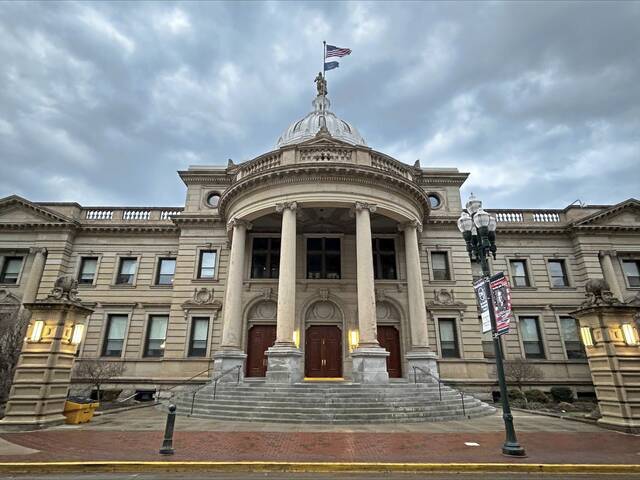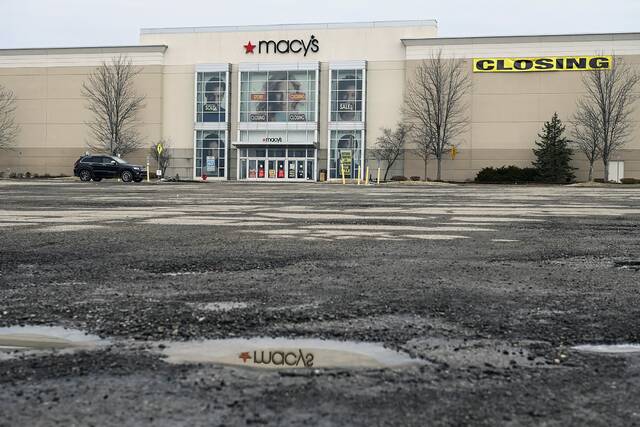State Rep. Ed Gainey and retired police officer Tony Moreno say they’re running for Pittsburgh’s highest office to tackle a range of problems in need of solutions right away.
If elected, Gainey, a Democrat, would become the city’s first Black mayor. Moreno, running as a Republican after finishing a distant third in the Democratic primary, would be the first Republican nominee elected to the position since the 1930s.
Moreno, 53, of Brighton Heights, said he decided to run for mayor instead of retiring with his wife to Florida because “nobody was doing anything about the problems that were right in front of us.”
“I can’t leave Pittsburgh worse than when I got here,” said Moreno, who was born and raised in California and served in the Army before moving to Pittsburgh to become a city police officer.
A lifelong Pittsburgher, Gainey, 51, of Lincoln-Lemington, is in his fifth term as a state representative in Harrisburg, where he serves on the Appropriations, Education, Labor & Industry and Transportation committees. He said he’s running for mayor out of his love for Pittsburgh and a desire to right the wrongs he sees in it.
“I’ve always wanted to have a city that was inclusive of everybody, where everybody felt they could make it here, a city where no one felt left behind,” Gainey said. “I want to see that we can build a city that is for everybody, where everybody feels safe.”
During protests after the death of George Floyd, Gainey said he felt inspired to see people of all ages, races and genders come together. He said it made him believe that he could help heal and unite the city as mayor.
“I was thinking this is the greatest time to build a bridge between yesterday and today, the greatest time to talk about why we need to be diverse, why we need to keep our real estate affordable and why we need to be safe,” he said.
He said those are the cornerstones of his campaign.
Gainey said he wants to enact a public health plan that would address violence, drugs and alcohol, housing, education, employment and equity — particularly for the city’s Black women. The initiative also would include investing heavily in the city’s Department of Public Works, which would be tasked with cleaning up blighted neighborhoods.
Gainey also is advocating for police reform. As a start, he said police officers should “walk the beat” to better understand the neighborhoods and people they serve.
“We’ve got to talk about police-community relations,” he said. “We don’t need to over-police neighborhoods. There needs to be equity across the board. There needs to be more social workers out on call. That’s their ministry — they know how to de-escalate situations.”
Moreno, who said he would push for more accountability and transparency in the police department, said police in the past had tried to implement a system in which social workers would ride along with officers, but local politicians didn’t allow that to go into effect.
Moving funds from the police to separate social workers and violence intervention teams is a “failed fairytale policy,” he said.
Moreno pushed instead for more police officers in the communities, more transparency and accountability and better enforcement of police policies.
Another key issue for both candidates during the campaign has been affordable housing.
“We need to pass inclusionary zoning so that housing and development projects that come before us have affordability embedded into it,” Gainey said.
Moreno offered a different approach to the city’s affordable housing crisis, instead suggesting that efforts should be made to train more Pittsburghers in skilled trades and then pay them to revitalize homes within their communities.
Both candidates said they have experience in the city’s neighborhoods that they would draw upon as mayor.
“My office will be on Grant Street, but my work is in these neighborhoods. If I’m not present in these neighborhoods, things don’t change. Where you see things happen is where leaders have had a presence in that neighborhood,” Gainey said. “We have to inspire and build the morale of this city, and you can’t do that behind a desk.”
Moreno said that as a police officer, he learned how to treat everyone in the city fairly, while learning to tackle their diverse problems.
“I have gone to all these neighborhoods. I have policed in them. And policing in them is different but everybody gets treated the same,” Moreno said. “Their problems are different, but you just take care of them. That’s how I intend to govern. Take politics right out of it.”
Moreno proposed funding a Department of Neighborhoods, which would allow members of the community to more directly voice their needs to local government.
While Moreno would become the first Republican elected mayor in nearly 100 years, he said he is running on the same platform as he did during the Democratic primary.
As for the Republican write-in votes he collected during the primary that put him on the Nov. 2 ballot, Moreno said, “Those are votes from Pittsburghers. Who am I to turn my back on them? I’m still in the fight. The fight is not about Republican and Democrat. The fight is about Pittsburgh and how we’re going to go forward.”
And while Gainey is poised to make history if elected as the city’s first Black mayor, he said he’s more concerned about evoking positive change for Pittsburgh than making a mark in the history books because of his race.
“I just want to be productive,” Gainey said. “I don’t care what color you are. I understand in the years I’ll be in office that I won’t transform the whole city. But we can start a change. If we can just be productive, then regardless of the color that’s in on Grant Street, we can be change for this whole region. That’s the opportunity.”








